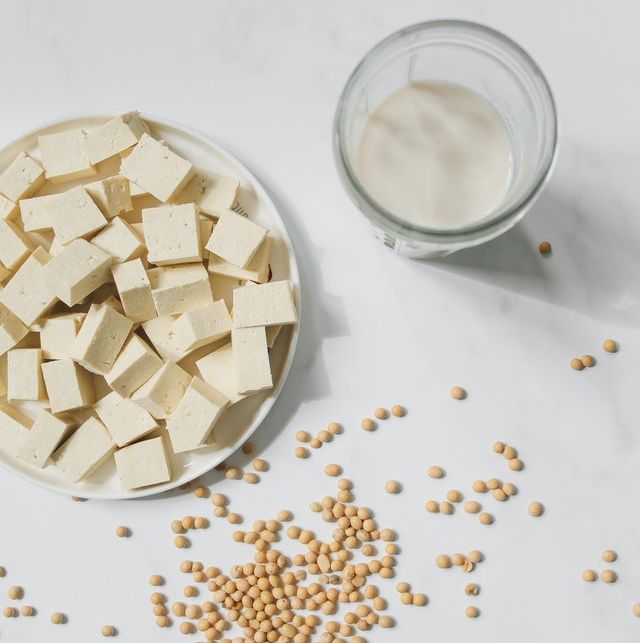Written by Sharon Palmer, MSFS, RDN, The Plant-Powered Dietitian. This post was originally posted on Forager.com.
Soy is a superfood with a long legacy of health, dating back to 1100 BC in China. In fact, it’s been a staple for centuries in traditional Asian diets, which are linked to lower risks of chronic diseases. Soy is sustainably grown, versatile to use in the kitchen, and packed with potent nutrients, including high-quality plant proteins.
Modern research has linked soy to multiple health benefits, including heart health and women’s health benefits. While soy is definitely a well-loved, go-to plant-based ingredient for much of the world, including the US, it has been widely misunderstood in recent years.
Soy is one of nature’s most perfect foods—a one-cup serving of cooked soybeans provides 57% Daily Value (DV) protein, 41% DV fiber, 49% DV iron, 18% DV calcium, 1,029 mg omega-3s, and 18% DV of twelve other essential vitamins and minerals, as well as other phytochemicals (saponins, phytosterols, and isoflavones). Yet soy is shrouded in rumors and myths. The truth is, these myths, which stem from outdated science based on animal studies, poorly designed studies that were very small with statistically insignificant results, are scientifically unfounded. That’s why leading health organizations, such as the American Institute for Cancer Research (AICR) and the American Heart Association, recommend soy for healthy eating. Let’s dive in and debunk the top 5 soy myths by letting facts, not unfounded fears, make up our minds.
Soy Myth #1: Soy causes breast cancer
This misconception stems from soy’s uniquely high levels of isoflavones, a type of plant estrogen (phytoestrogen). Phytoestrogens are naturally occurring in many plant foods, including several fruits, vegetables, and whole grains. They are associated with many health benefits, from a lower risk of heart disease and reduced menopausal symptoms to a reduced risk of several cancers, including breast cancer.
Scientifically, estrogen has been linked with an increased risk of breast cancer because estrogen receptors in breast tissue can, with the presence of estrogen, promote breast tumors. However, (this is where the confusion kicks in), phytoestrogens are not estrogen, and they act very differently in humans than estrogen. In fact, isoflavones have been shown to block potent estrogens from binding with receptors in the body.
A review of studies in China that included more than 300,000 women found that every 10 milligrams (mg) per day increment of soy isoflavones was associated with a 3% reduced risk of breast cancer. Another study (BMC Public Health, 2017), which looked at the impact of soy food intake on the risk of breast cancer and the estimated isoflavones consumed, found that women who consumed more than 22 mg of soy isoflavones per day (one serving of soyfood, such as 1 cup soymilk, ½ cup tofu or edamame) were 63% less likely to develop breast cancer compared to women who consumed less than 22 mg/day. Research now shows that soy foods are not only safe but potentially beneficial for women with breast cancer. Moderate intake (1-2 servings) of soy foods per day does not pose any health risks, even for breast cancer survivors, and may even reduce breast cancer recurrence and improve survival.
Soy Myth #2: Soy feminizes men
Similar confusions over the isoflavone-estrogen connection has raised concerns that soy affects estrogen levels in men, along with other female-like effects, like lower testosterone levels, reduced sperm count and fertility, erectile dysfunction, and feminization (i.e., “man boobs”).
According to a meta-analysis of 41 clinical studies (Reproductive Toxicology, 2021) on the feminizing effects of soy, no significant effects of soy protein or isoflavone intake were found, regardless of dose or study duration. Populations that consume high amounts of soyfoods do not show increased rates of male infertility or feminization issues. In fact, research suggests soyfood consumption may be why the men in these countries have low rates of prostate cancer. A recent meta-analysis (Nutrients, 2018) found that men who consumed the most soy were 29% less likely to develop prostate cancer compared to men consuming soy infrequently. Research also supports the importance of soy protein for the lifelong maintenance of muscle mass and strength. A review of 9 studies (International Journal of Sport Nutrition and Exercise Metabolism, 2018) involving men who practiced resistance training found similar gains in muscle mass and strength with soy protein and animal protein, specifically whey protein.
Soy Myth #3: Soy is not a good dairy replacement
Alternative plant-based milks, yogurts, cheeses, butter, ice cream, and more are crowding out traditional dairy products as plant-based, dairy-free replacements as a way to provide health, environmental, and animal welfare benefits. Research has long supported soymilk—the original, traditional plant milk—as the healthiest of these plant-based alternatives. Soymilk is the most similar to dairy milk in terms of nutrient profile, being the highest in protein compared to other plant milks (except for those that are fortified with additional protein). When fortified with calcium, vitamin D, and vitamin B12, soymilk is almost nutritionally identical to dairy milk, and it has the advantage of containing no cholesterol or saturated fat.
Soy dairy alternatives are an option for those with milk allergies or lactose intolerance, especially infants and children, which is very common worldwide. Fortified soymilk and soy yogurt are the only plant-based dairy alternatives considered nutritionally appropriate to be included as a dairy replacement in the Dietary Guidelines for Americans 2020-2025.
Soy Myth #4: Soy is not sustainable
GMO is a topic of concern when choosing the foods we eat. Almost all minimally processed soyfoods are based on whole non-GMO soybeans, including soymilk and soy yogurt, tofu, tempeh, and edamame.
Soy grown for human consumption is very small (less than 1% of total soybean production) compared to what is grown for animal feed. When you read about deforestation around the world to make way for growing soy, it is related to the issue of animal feed, a rising global climate concern. As it pertains to human consumption, soy is one of the most sustainable protein sources.
Research (Global Food Security, 2021) shows that compared to nearly all other protein sources, legumes including soybeans have a low global warming potential and a very small environmental impact. One study (Food Policy, 2011) found that of 22 plant and animal proteins evaluated, soybeans were the most efficiently produced and provided the most protein per greenhouse gas emission.
Soy Myth #5: Soy causes thyroid problems
Thyroid disorders affect a lot of people, so they have garnered attention over the years. Decades-old research, primarily on animals and in vitro, led to a possible connection between soybean isoflavones and thyroid function. Since then, many studies have been published that conclude there is little evidence of adverse effects for this relationship. In fact, a review of more than 400 studies published in a 2021 Critical Reviews in Food Science and Nutrition, found that isoflavone intake does not adversely affect thyroid function. There is no convincing evidence that moderate intake of soyfoods will negatively impact the thyroid or health in general.
The bottom line is that soy foods, including soy milk and yogurt, are healthful foods that you should consider including in your diet more often. These foods boast a lower environmental footprint, positive health outcomes, and affordable, versatile opportunities in the kitchen.





